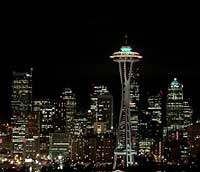The high priests of free trade are getting nervous. Corporate and government officials from the 134 nations that belong to the World Trade Organization (WTO) have long planned to meet in Seattle at the end of this month to negotiate the next round of global trade rules. Now they discover that thousands of angry citizens will be there too, to suggest, not politely, that workers and farmers and communities and the environment ought be represented.

Seattle: Space for activists to needle the powers-that-be.
Jeffrey Garten, a former undersecretary of commerce in the Clinton administration, writes in Business Week: “In late November, Seattle is likely to be the scene of a big test for global capitalism. That’s when more than 1,000 non-governmental organizations (NGOs) are planning to disrupt the kickoff of a new round of global trade negotiations. If Washington and Corporate America don’t move decisively, NGOs could dominate public opinion on global trade and finance.”
(As opposed to Washington and Corporate America dominating public opinion?)
An editorial writer in The Economist warns: “The long battle for free trade must be waged against many enemies” and lists among them “trade unionists” and “a newish troop of combatants: environmentalists.”
(What are you fighting for, that causes you to regard citizens who care about workers and the environment as enemies?)
Charlene Barshefsky, U.S. Trade Representative, worries in Financial Times: “The single greatest threat to the multilateral trade system is the absence of public support.”
(Could there be good reasons for the absence of public support?)
WTO Director Michael Moore says in the Washington Post: “I just hope they are as reasonable as we try to be and that we engage in an intellectual, democratic way without any media terrorism.”
(Is the WTO director engaging in a “democratic way” by calling ordinary people’s attempts to put their views across “media terrorism”?)
Yep, they’re scared, these power-brokers of world trade, and they should be. If the big media (themselves a part of Corporate America) make any serious effort to transmit the views of the demonstrators outside the Seattle meeting hall, the WTO will gain no public support.

Where will the trade winds blow this ship?
My email is full of the excited plans of the demonstrators. I am invited to a People’s Tribunal on Corporate Crimes Against Humanity. (“The real enemy of the people and the biosphere … is not the World Trade Organization but those structures of power which created it and which it serves — namely, giant global corporations now larger than most nation states. One purpose of the Tribunal is to … underscore just how destructive of fundamental human rights, the environment and democratic process the world’s largest corporations are.”)
I’ve been asked to speak on Food and Agriculture Day (December 2), which will include sessions with titles such as: “Naming the Problem: Corporate Control and the Industrialization of Agriculture” and “What Are We Trading Away? Food Security and Food Safety.” Speakers are coming from Africa, India, Europe, the Philippines, Bangladesh, Mexico, and Canada.
I wish I could go. The action outside the hall will be way more colorful than the suited dignitaries inside arguing about TRIPS (Trade Related Intellectual Property Rights) and TRIMS (Trade Related Investment Measures). Outside, the full range of life and values. Inside, the pitiful, constricted concerns of the folks who live for money and power.
The demonstrators may be portrayed by the corporate media as radical nuts, but they’ve done their homework. My desk is covered with their publications. They’ve conducted workshops and conferences and teach-ins. They may be the only people outside corporate law and government trade offices who have read any of the 700 pages of world trade agreements. They have watched the WTO work, day by day, since its founding in 1995, and they are outraged.

Seattle’s Pike Place Market.
Their case, in brief, is that the WTO joins the World Bank and the International Monetary Fund as the only departments of world government with clout. They can collect taxes, allocate loans, and impose fines and sanctions in a way the United Nations can only dream about. (The United States has suffered no consequences from its nonpayment of U.N. dues, but it snaps to attention when threatened with a WTO sanction.) It is as if on a global scale we had a government with only a Commerce Department. The officials in this global Commerce Department are not elected. Neither the public nor the press are allowed to be present at their deliberations, but corporations are. The decisions that emerge from this body (about which I will write next week) predictably serve only narrow commercial interests, at the expense of society and environment.
The situation is strikingly reminiscent of the time 200-plus years ago, when upstart settlers threw some tea into Boston Harbor. The reporting may be similar to the way the London papers back then must have described those settlers. What’s the matter with them? Why aren’t they willing to be ruled from afar by privileged folks who meet in secret? Why won’t they turn their lives and resources over to the enrichment of the already rich? How can they oppose the sacred idea of the monarchy? (Or today’s equivalent, the sacred idea of free trade.)
Keep your eye on Seattle. Should be fun!


